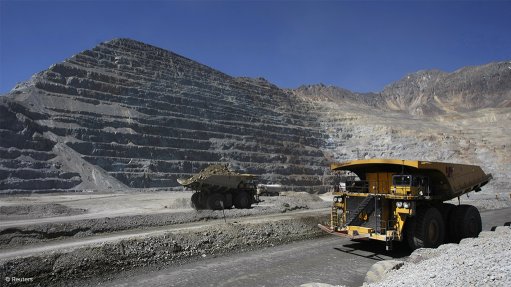
KEY ECONOMIC CATALYST
Between 2016 and 2018, many of the world’s poorest countries relied on income from mining as the primary driver of economic activity
Photo by: Reuters
Last month, the International Council on Mining and Metals (ICMM), an international organisation dedicated to a safe, fair and sustainable mining and metals industry, published two reports – 'Role of Mining in National Economies: The Mining Contribution Index (5th edition)' and 'ICMM Members’ Tax Contribution Report: 2019 update' – that highlight the contribution the mining industry makes to the economic development of host countries.
Together, these reports demonstrate the pivotal role mining plays in many national economies, and the contribution it makes throughout commodity cycles.
The Mining Contribution Index (MCI): 5th Edition
This report shows that between 2016 and 2018, many of the world’s poorest countries relied on income from mining as the primary driver of economic activity. As a result, 21 of the top 25 ranked countries in this edition qualify as resource dependent using the criteria applied in ICMM’s 'Social Progress in Mining-Dependent Countries' report.
Published every two years, the MCI ranks 183 countries according to the relative importance of mining to the economy of those countries. The fifth edition saw seven new entrants to the top ranked 25 countries, with Suriname and the Democratic Republic of the Congo retaining the top spots. Across all five editions of the MCI, the top 25 remain dominated by low and middle-income economies.
Notably, six of the seven countries that dropped out of the top 25 in this edition were African, a contrast to the increase in African countries within the top 25 in the previous edition. These changes were as a result of a recovery in gross domestic product across the continent between 2016 and 2018.
The fifth edition of the MCI confirms that many of the world’s most mining dependent countries continue to rely on their natural resources as the primary driver of economic activity. The Natural Resource Governance Institute’s Resource Governance Index rates 84% of the top 25 ranked countries in the MCI as weak, poor or failing. It is therefore clear that there is more to do to ensure that mining’s contribution to national economies is maximised and that mineral wealth translates into broader economic and social progress.
The ICMM Members' Tax Contribution Report: 2019 Update
This report, prepared by assurance, advisory and tax services firm PwC, extends the dates covered by ICMM’s first members’ tax contribution report, to include 2018 and 2019.
Over the 2013 to 2019 commodity cycle, the survey participants reported corporate income tax (CIT) payments of $96.6-billion and royalty payments of $56.7-billion, totalling a contribution of $153.3-billion to public finances. During this period, for every $100 of profit before impairments, $39.40 was charged in corporate income tax and royalties.
The 2019 update of the ICMM Members’ Tax Contribution Report shows that after a decline in the first half of 2016, commodity prices recovered and, together with general economic growth, led to an increase of tax and royalties. However, even in 2016, when some members were making little to no profit, they still paid $5.5-billion in royalties, providing a dependable stream of revenue for host governments through the cycle. In 2018 and 2019, ICMM members that completed the most recent survey reported total CIT and royalties of $25.5-billion and $26.8-billion, respectively, significant increases from the reported $17.3-billion in 2017.
ICMM social and economic development director Nicky Black said: “Taken collectively, both reports paint a picture of the contribution mining makes at a national level. We know from the 'Social Progress in Mining-Dependent Countries' report that responsible mining can be transformative, leading to substantial reductions in levels of poverty and overall improvements in social wellbeing.”
Black added that mining companies stimulate economic activity by providing exports and revenue, which can drive investment in education, healthcare, infrastructure and government support.”
ICMM members recognise that efficient, effective, transparent and stable resource governance is critical in ensuring that mineral wealth translates into broad-based economic and social progress, she states, adding that through these reports, the ICMM hopes to encourage evidence-based debate and focus attention on the vital role of effective mineral resource governance.
Black will be a speaker at the 2021 Investing in African Mining Indaba taking place virtually on February 2 and 3. She will be speaking during the ‘4IR: How Can African Mining Harness Technology & Automation in a Pandemic to Help Grow Economies?’ session, which will take place on the first day of the conference.